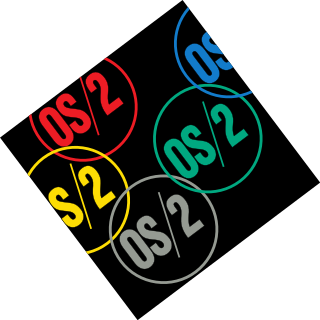
OS/2 is a series of computer operating systems, initially created by Microsoft and IBM under the leadership of IBM software designer Ed Iacobucci. As a result of a feud between the two companies over how to position OS/2 relative to Microsoft's new Windows 3.1 operating environment, the two companies severed the relationship in 1992 and OS/2 development fell to IBM exclusively. The name stands for "Operating System/2", because it was introduced as part of the same generation change release as IBM's "Personal System/2 (PS/2)" line of second-generation personal computers. The first version of OS/2 was initially released in December 1987, and newer versions were released until December 2001.

In computer data storage, drive letter assignment is the process of assigning alphabetical identifiers to volumes. Unlike the concept of UNIX mount points, where volumes are named and located arbitrarily in a single hierarchical namespace, drive letter assignment allows multiple highest-level namespaces. Drive letter assignment is thus a process of using letters to name the roots of the "forest" representing the file system; each volume holds an independent "tree".

FreeDOS is a free software operating system for IBM PC compatible computers. It intends to provide a complete MS-DOS-compatible environment for running legacy software and supporting embedded systems.

Knoppix, stylized KNOPPIX, is an operating system based on Debian designed to be run directly from a CD / DVD or a USB flash drive. It was first released in 2000 by German Linux consultant Klaus Knopper, and was one of the first popular live distributions. Knoppix is loaded from the removable medium and decompressed into a RAM drive. The decompression is transparent and on-the-fly.

A flash drive is a data storage device that includes flash memory with an integrated USB interface. A typical USB drive is removable, rewritable, and smaller than an optical disc, and usually weighs less than 30 g (1 oz). Since first offered for sale in late 2000, the storage capacities of USB drives range from 8 to 256 gigabytes (GB), 512 GB and 1 terabyte (TB). As of 2023, 2 TB flash drives were the largest currently in production. Some allow up to 100,000 write/erase cycles, depending on the exact type of memory chip used, and are thought to physically last between 10 and 100 years under normal circumstances.

Multi-booting is the act of installing multiple operating systems on a single computer, and being able to choose which one to boot. The term dual-booting refers to the common configuration of specifically two operating systems. Multi-booting may require a custom boot loader.

PCLinuxOS, often shortened to PCLOS, is a rolling release Linux distribution for x86-64 computers, with KDE Plasma, MATE, and XFCE as its default user interfaces. It is a primarily FOSS operating system for personal computers aimed at ease of use.

ESET NOD32 Antivirus, commonly known as NOD32, is an antivirus software package made by the Slovak company ESET. ESET NOD32 Antivirus is sold in two editions, Home Edition and Business Edition. The Business Edition packages add ESET Remote Administrator allowing for server deployment and management, mirroring of threat signature database updates and the ability to install on Microsoft Windows Server operating systems.
The Advanced Host Controller Interface (AHCI) is a technical standard defined by Intel that specifies the register-level interface of Serial ATA (SATA) host controllers in a non-implementation-specific manner in its motherboard chipsets.

The USB mass storage device class is a set of computing communications protocols, specifically a USB Device Class, defined by the USB Implementers Forum that makes a USB device accessible to a host computing device and enables file transfers between the host and the USB device. To a host, the USB device acts as an external hard drive; the protocol set interfaces with a number of storage devices.

eComStation or eCS is an operating system based on OS/2 Warp for the 32-bit x86 architecture. It was originally developed by Serenity Systems and Mensys BV under license from IBM. It includes additional applications, and support for new hardware which were not present in OS/2 Warp. It is intended to allow OS/2 applications to run on modern hardware, and is used by a number of large organizations for this purpose. By 2014, approximately thirty to forty thousand licenses of eComStation had been sold.
The following tables compare general and technical information for a number of file systems.

Sugar is a free and open-source desktop environment designed for interactive learning by children. It was developed by SugarLabs. Developed as part of the One Laptop per Child (OLPC) project, Sugar was the default interface on OLPC XO-1 laptop computers. The OLPC XO-1.5 and later provided the option of either the Gnome or Sugar interfaces.

Parallels Desktop for Mac is software providing hardware virtualization for Macintosh computers with Intel processors, and since version 16.5 also for Apple silicon-based Macintosh computers. It is developed by Parallels, since 2018 a subsidiary of Corel.
OtherOS is a feature of early versions of the PlayStation 3 video game console, allowing user installed software, such as Linux or FreeBSD. The feature was removed since system firmware update 3.21, released on April 1, 2010.

Oracle VM VirtualBox is a hosted hypervisor for x86 virtualization developed by Oracle Corporation. VirtualBox was originally created by InnoTek Systemberatung GmbH, which was acquired by Sun Microsystems in 2008, which was in turn acquired by Oracle in 2010.

DisplayLink is a semiconductor and software technology company owned by Synaptics that develops the DisplayLink USB graphics technology. This technology enables computers and displays to connect using USB, Ethernet, and WiFi and also allows for multiple displays to be connected to a single computer. DisplayLink's primary customers include notebook OEMs, LCD monitor manufacturers, and PC accessory vendors, and their technology is compatible with a wide range of operating systems, including Microsoft Windows, macOS, Android, ChromeOS, and Linux.
NVM Express (NVMe) or Non-Volatile Memory Host Controller Interface Specification (NVMHCIS) is an open, logical-device interface specification for accessing a computer's non-volatile storage media usually attached via the PCI Express bus. The initial NVM stands for non-volatile memory, which is often NAND flash memory that comes in several physical form factors, including solid-state drives (SSDs), PCIe add-in cards, and M.2 cards, the successor to mSATA cards. NVM Express, as a logical-device interface, has been designed to capitalize on the low latency and internal parallelism of solid-state storage devices.

A new version of AmigaOS was released on December 24, 2006 after five years of development by Hyperion Entertainment (Belgium) under license from Amiga, Inc. for AmigaOne registered users.

Purism, SPC is an American computer technology corporation based in San Francisco, California and registered in the state of Washington.





















